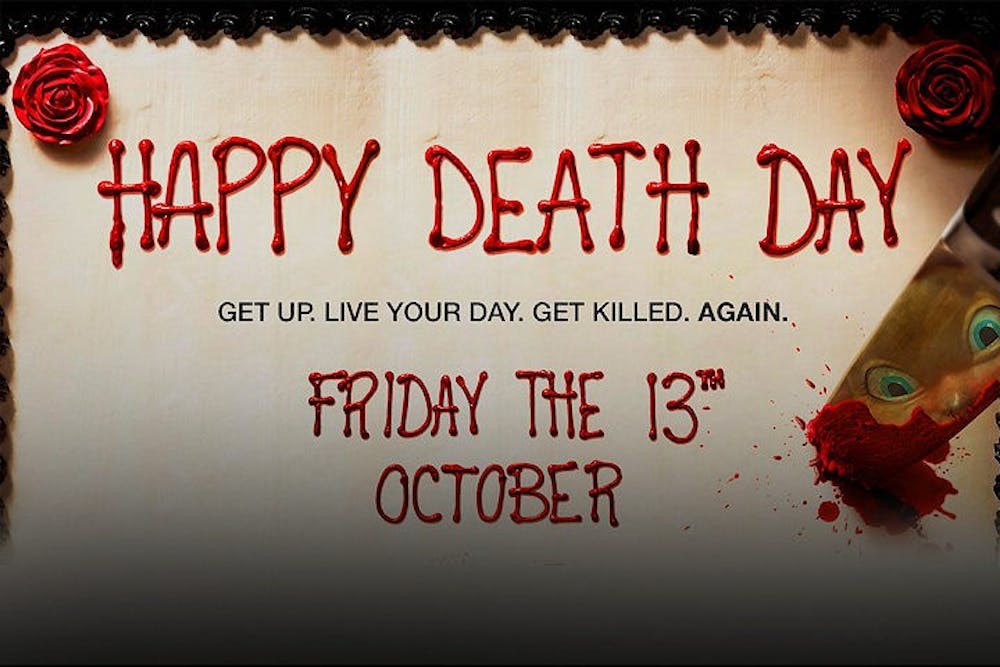What makes a movie worthy of being classified as “horror”? Is it how many screeches it elicits from the audience? Is it the excessive amount of gore? Maybe it’s the lingering feeling of terror that the viewer experiences after the screen goes black. Arguably, any of these would be enough to grant a movie its genre. Happy Death Day, though, does the undoable: none of these conditions are applicable in its case—yet it is, undeniably, a “horror” movie. In fact, I would go as far as saying that it’s the most horrendous movie that I’ve ever seen.
The storyline is mostly comprised of filler moments, which I would say make up at least 70 of the 96 minutes of the film. This exact succession of events is repeated 10 (11, 12? ... I lost track) times, with slight alterations so as to make it seem that there was some creativity involved in the production: Tree Gelbman (Jessica Rothe, La La Land) is an archetypal mean sorority girl at a university in the South. One unfortunate morning, she wakes up to the sight of a not–so–glamorous dorm room: it seems like she left the party she’d been at the night before with Carter (Israel Broussard, The Bling Ring). Carter is representative of the nice guy/cute nerd crossover, which by Hollywood–logic means that Tree, conventionally beautiful and popular, is way out of his league. It’s not only this discrepancy in social ranking that bugs Tree: she is painfully hungover on her birthday morning, and she will have to do the Walk of Shame all across campus to her sorority house. The horror! After ditching flyerers, being soaked by a sprinkler, and running into Tim—a guy she’s ghosted—she makes it back. Despite her tiptoeing upstairs, she is still spotted by Danielle, a sister whose characteristic line—“You sneaky little biatch!”—starts an awkward dialogue between the two. Tree lashes out at everyone, including her shy, sweet roommate, who was kind enough to bake her a cupcake for her birthday. Later that night, Tree has to go to her birthday party. She walks alone, and on her way to the frat house, she passes a group of football fans wearing masks. One of them follows her to a tunnel where a creepy merry–go–round toy is playing “Happy Birthday” in a broken tune, and inexplicably kills her. But Tree doesn’t die—she wakes up in the exact same dorm room, at the exact same time, and it’s still her birthday.
The movie basically follows Tree (and later Carter) trying to solve her murder. She eliminates each suspect one by one and eventually manages to find her killer. The idea had a lot of potential—a murder–mystery/fantasy movie set on a college campus would undeniably appeal to a wide audience. Add to that a few eye–catching secondary storylines—a teacher–student affair, a love story—and you’re almost guaranteed success. That is, on the premise that the movie is produced, written, and directed correctly. But Happy Death Day often forgets that it is intended to be a horror film. The countless “scary moments” are so bad they are laughable. The expected “funny moments” are even worse because somehow even they escape their purpose. The twists and turns of the storyline are anything but unpredictable, and a lot of situations—such as a fight involving food during which the words, “Eat it, bitch!” are uttered in a way–too–dramatic voice—are so absurd that you almost forget the (unanswered) main question behind the film: why does Tree keep coming back to life?
Happy Death Day is, before anything, a college movie. Indeed, judging by the intended audience, it would make sense for the producers to focus on incorporating certain elements of campus culture so as to make the story relatable. If I thought the movie was beyond boring otherwise, it was this intention that gave it its interestingly “horrific” elements—elements that we, as college students, encounter all day, every day. I was horrified when I realized rape culture was so prevalent in the general mentality of the characters (both men and women), that Tree inevitably fell for the one guy who treated her as a normal human being and chose not to take advantage of her while she was blackout drunk. I was horrified when the obsession with a “perfect” body went so far as to make the sorority girls feel incredible guilt for eating in public, or for eating a cupcake from time to time. I was horrified when a gay man’s sexual orientation was made into one of the comedic reliefs of the movie, as if there was anything to laugh about.
Happy Death Day is, therefore, a horror movie. From a technical and artistic point of view, it is horrible: instances of such a bad writing/acting/directing mix are rare and notable, and it would be surprising if the Razzies snubbed it. From an ideological point of view, however, it is horrifying: it manages to put some chilling issues into the limelight, while also showing how little the members of the campus community do to solve them.
Happy Death Day premieres in theaters across the US on October 13th.

